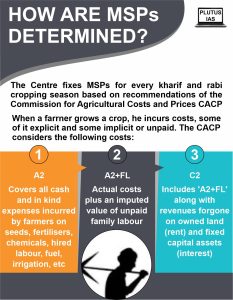20 Oct Minimum Support Price (MSP)
This article covers “Daily Current Affairs” and the topic details “ Minimum Support Price (MSP)”. This topic has relevance in the Agriculture section of the UPSC CSE exam.
For Prelims:
About MSP?
Objectives of MSP?
Crops Covered by MSP?
For Mains:
GS 3: Agriculture
MSP and its effects?
Why in the news?
The government has increased the minimum support price (MSP) for wheat to be sown in the upcoming 2023-24 rabi season. The MSP for wheat has been raised by Rs 150, reaching a level of Rs 2,275 per quintal. This marks the most substantial increment since the consecutive crop years of 2006-07 and 2007-08 when similar increments were observed.
Introduction to Minimum Support Price (MSP)
The Minimum Support Price (MSP) is a crucial policy in Indian agriculture. It represents the government’s commitment to provide a minimum guaranteed price for various agricultural crops, which is aimed at ensuring the economic well-being of farmers. MSP is determined by calculating at least one-and-a-half times the cost of production incurred by farmers for a particular crop.
Objectives of MSP
- Agricultural Price Stabilization: MSP serves as a floor price, helping to stabilize agricultural commodity prices and preventing extreme fluctuations. This stability is essential for ensuring a steady income for farmers.
- Crop Diversity: MSP encourages farmers to diversify their crop cultivation by assuring them of fair prices for a variety of crops. This promotes crop diversification, reduces the risk of over-reliance on a single crop, and enhances agricultural sustainability.
Crops Covered by MSP
The Commission for Agricultural Costs & Prices (CACP), an attached office of the Ministry of Agriculture and Farmers Welfare, is responsible for recommending MSPs for various crops. These crops can be categorized as follows:
- Mandated Crops: MSPs are recommended for 22 mandated crops, which include 14 crops of the kharif season (summer), 6 Rabi crops (winter), and 2 other commercial crops. These mandated crops are the primary focus of MSP implementation.
- Sugarcane (Fair and Remunerative Price, FRP): In addition to the mandated crops, the government also fixes the Fair and Remunerative Price (FRP) for sugarcane to support sugarcane farmers.
- Derivative MSPs: In some cases, the MSPs for certain crops like toria and de-husked coconut are determined based on the MSPs of related crops, such as rapeseed/mustard for toria and copra for de-husked coconut.

MSP and its effects:
-
- Enhancing Farmers’ Income and Livelihood: MSP acts as a financial safety net for farmers, ensuring that they receive a reasonable income, even in the face of market volatility and unfavorable conditions.
- Income Redistribution: The increase in farmers’ income due to MSP can lead to a rise in rural purchasing power, potentially reducing income inequality between rural and urban populations.
- Food Security: MSP guarantees a consistent supply of essential agricultural products, contributing to food security by maintaining stable prices for consumers.
- Inflationary Pressure: An elevated MSP can exert inflationary pressures, as the higher costs of procurement may result in increased consumer prices for agricultural goods.
- Fiscal Burden: The government’s substantial financial commitment to procuring crops at MSP can strain fiscal resources, potentially impacting fiscal deficit targets.
- Trade Balance and Exports: A higher MSP may elevate domestic prices, potentially affecting the competitiveness of exports and trade balances.
- Distorted Crop Selection: Farmers may prioritize crops covered by MSP, potentially leading to an overproduction of certain crops while neglecting others in their agricultural practices.
- Supply Chain Efficiency: MSP-driven procurement can place stress on storage and distribution systems, potentially resulting in wastage and inefficiencies in the agricultural supply chain.
- Market Distortions: A heavy reliance on MSP may discourage private sector investment in agriculture due to market uncertainties and government intervention.
- Policies and Regulations: MSP necessitates government intervention in agricultural markets, potentially influencing the dynamics of free-market forces.
- Rural-Urban Linkages: MSP’s impact on rural income can influence patterns of rural-urban migration and urban development. This linkage between rural and urban areas is affected by MSP policies.
Commission for Agricultural Cost & Prices (CACP):
- The Commission for Agricultural Cost & Prices (CACP) is a statutory panel operating under the Ministry of Agriculture & Farmers’ Welfare, Government of India.
- This expert body is responsible for proposing Minimum Support Prices (MSPs) for the notified Kharif and Rabi crops to the Cabinet Committee on Economic Affairs (CCEA).
- The primary goal of the Commission is to encourage farmers to embrace modern technology, enhance resource utilization, and boost productivity.
- It’s worth noting that the recommendations made by the CACP are not obligatory for the Government.
Source:Increase in MSP for wheat: A political hike | The Indian Express
Download plutus ias current affairs eng med 20th Oct 2023
Q.1 Which of the following statements about the Commission for Agricultural Cost & Prices (CACP) is/are correct?
- CACP is a constitutional body operating independently of the government.
- It is responsible for recommending Minimum Support Prices (MSPs) for both Kharif and Rabi crops.
- The primary aim of the Commission is to encourage farmers to adopt modern technology and improve productivity.
- The recommendations of CACP are binding on the Government of India.
Q.2 Consider the following statements regarding Minimum Support Prices (MSPs) and Fair and Remunerative Prices (FRP):
- The government fixes Fair and Remunerative Prices (FRP) for sugarcane.
- Derivative MSPs are determined based on the MSPs of related crops.
- MSPs are primarily recommended for 22 mandated crops, including those of the Kharif season.
How many of the above statement/s is/are correct?
(a) Only one
(b) Only two
(c) All three
(d) None
Q.3 How does the Minimum Support Price (MSP) policy in India impact the trade-off between ensuring farmers’ income security and the potential market distortions it can create? Provide analysis of the economic, social, and political implications of the MSP policy on Indian agriculture and its stakeholders.



No Comments